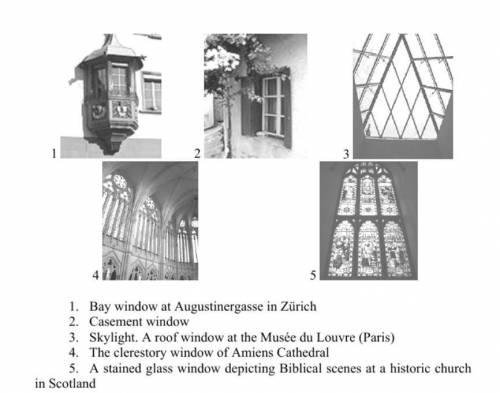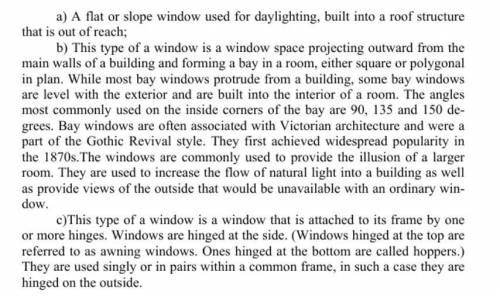выполнить задание нужно соединить цифры с буквами



Другие вопросы по теме Английский язык
Популярные вопросы
- Х(х+3)=70дискременат тауып беририздерши...
3 - Перевод с французского на текст,из учебника кулигина 4 класс en...
1 - Одинаковое ли число молекул в 0.5 моль кислорода и 0.5 моль углекислого...
2 - Объясни смысл паговорки (что написна пером,того на наварубиш топором)...
2 - Замените словосочетание с гордостью удалился из в примыкание....
1 - Поставьте в мн число слова: тренер,инженер,профессор,трактор,директор,кабель,прожектор,стакан,шофёр,редактор,скорость,учитель,год...
2 - Скласти анкету дослідження ринку для власного товару чи надання...
1 - Сделай схематический чертеж по и реши ее. 1)расстояные между двумя...
3 - Приставка корень окончание нужны слова...
2 - Составить интервью от 1 го лица про природу...
3
1. Bay window at Augustinergasse in Zürich - b) This type of a window is a window space projecting outward from the main walls of a building and forming a bay in a room, either square or polygonal in plan. While most bay windows protrude from a building, some bay windows are level with the exterior and are built inthe interior of a room. The angles most commonly used on the inside corners of the bay are 90, 135 and 150 degrees. Bay windows are often associated with Victorian architecture and were a part of the Gothic Revival style. They first achieved widespread popularity in the 1870s. The windows are commonly used to provide the illusion of a larger room. They are used to increase the flow of natural light into a building as well as provide views of the outside that would be unavailable with an ordinary window.
2. Casement window - c) This type of a window is a window that is attached to its frame by one or more hinges. Windows are hinged at the side. (Windows hinged at the top are referred to as awning windows. Ones hinged at the bottom are called hoppers) They are used singly or in pairs within a common frame, in such a case they are hinged on the outside. They are opened with a crank, lever, or cammed handle, which is placed around hand height or at the bottom and serves as a window lock. A crank, stay, or friction hinge is necessary when the window opens outside, to hold the window in position despite wind.
3. Skylight. A roof window at the Musée du Louvre (Paris) - a) A flat or slope window used for daylighting, built into a roof structure that is out of reach;
4. The clerestory window of Amiens Cathedral - e) These are any high windows above eye level. The purpose is to bring outside light, fresh air, or both into the inner space. Historically, it denoted an upper level of a Roman basilica or of a Gothic church, the walls of which rise above the rooflines of the lower aisles and are pierced with windows.
5. A stained glass window depicting Biblical scenes at a historic church in Scotland - d) A window composed of pieces of colored glass, transparent, translucent or opaque, frequently portraying persons or scenes. Typically the glass in these windows is separated by lead glazing bars. This type window was popular in Victorian houses, and are especially common in churches.